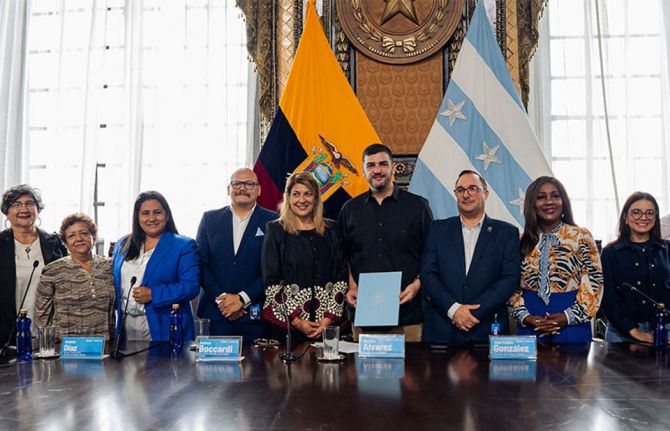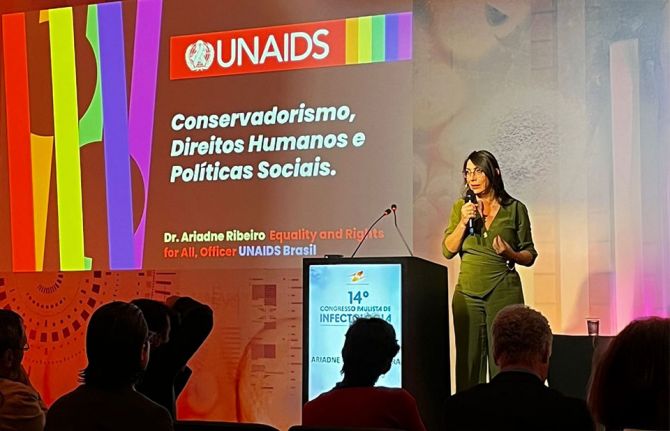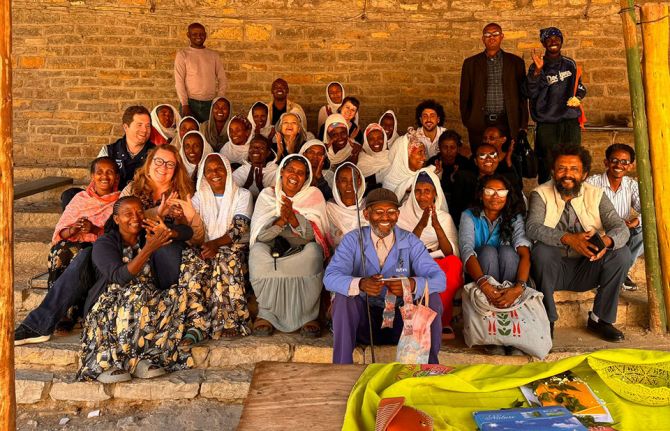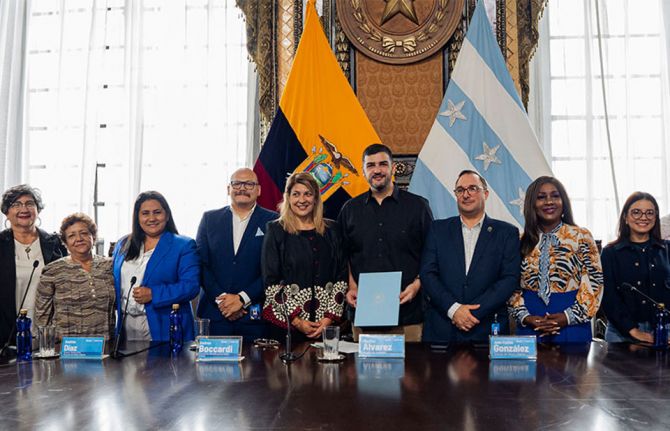ECU


Feature Story
Guayaquil joins the worldwide group of cities committed to ending the HIV epidemic
15 March 2024
15 March 2024 15 March 2024Mayor Aquiles Alvarez Henriques of Guayaquil, Ecuador's largest city and the nation's main port, signed the Paris and Sevilla Declarations on February 28, placing the city among the almost 500 municipalities around the world that are committed to fast-tracking action at local level to improve the quality of life of people living with and affected by HIV. Through this commitment, the city pledges to contribute to the country's goal of ending AIDS as a public health threat by 2030.
Guayaquil is the capital of the province of Guayas, Ecuador's most populated province and the most affected by HIV, with over a third of all new HIV infection notifications in the country, according to the Ministry of Public Health of Ecuador. It has a concentrated epidemic among key populations, with an HIV prevalence of 7.3% among gay men and other men who have sex with men (MSM), for example.
"A significant number of cases reported with HIV in 2023 live in Guayaquil", said Andrés Díaz, Technical Director of the city's Infectious Disease Prevention Unit of the Health and Hygiene Directorate. "We know that the best way to improve HIV prevention is through education and sensitization of citizens so that they can get tested."
Guayaquil has made significant efforts to intensify HIV screening and has increased the detection of HIV-positive cases by 1.6%. Diagnosed people are immediately linked to the public health system to start first-line antiretroviral treatment, which is universally available to nationals and migrants in Ecuador.
Nonetheless, the Health Department of the Guayaquil Municipality has developed a plan with key actions to be implemented as a result of the city’s commitment to the Fast-Track initiative. Some of the most strategic priorities incorporate the scale up of HIV services, including HIV prevention, early diagnosis, and timely treatment of HIV and other sexually transmitted infections; the sensitization of civil servants on issues of stigma, discrimination, and gender-based violence linked to HIV; and facilitate the engagement of communities, specially from key and vulnerable population, in the definition and implementation of HIV programmes at community level.
Representatives of community and civil society organizations such as Corporación Kimirina, the Ecuadorian Coalition of People Living with HIV, and the Silueta X LGBT+ Trans Association attended the event. These organizations play a crucial role in the city's efforts to respond to HIV. "Citizen involvement under the local authority's leadership, with emphasis on the most vulnerable and at-risk community groups, is vital to achieving the goal of ending AIDS by 2030,” emphasized the delegates of Corporacion Kimirina Maria Elena Acosta and Lily Marquez. Similarly, Joan Morales from the Ecuadorian Coalition of People Living with HIV stressed that "By signing the Paris and Sevilla Declarations, Guayaquil joins many other cities that have committed to provide accelerated and sustained health services that allow us to eradicate not only AIDS but also TB, Malaria, and other tropical diseases, with actions that contribute to reducing discrimination towards people living with HIV and other affected communities."
Created in 2014, the Paris Declaration on Fast-Track Cities Ending the HIV Epidemic is a political declaration with commitments and targets that include ending urban AIDS and tuberculosis (TB) epidemics, as well as eliminating viral hepatitis (HBV and HCV). It also articulates a mandate to place people at the center of the response. To define and facilitate that mandate, the Sevilla Declaration on the Centrality of Communities in Urban HIV Responses was created in 2022, outlining the 10 commitments that cities and municipalities are asked to make to increase the engagement of and promote leadership by affected communities in attaining the Fast-Track Cities initiative's goals, objectives, and targets.
"We congratulate the Mayor's Office of Guayaquil for its commitment to contribute to Ecuador’s efforts to reach the 2025 Global AIDS Strategy targets, reducing the number of new HIV infections and AIDS-related deaths and eliminating stigma and discrimination in all its forms,” said Andrea Boccardi Vidarte, Director of the UNAIDS Office for the Andean Countries. "This commitment is also a recognition of the leadership of communities most affected by HIV and their support to the city's goals."
Our work
Region/country
Related

Feature Story
Community-led initiative helps LGBTI migrants to learn their rights in Ecuador
21 September 2021
21 September 2021 21 September 2021“My life is now in my hands,” says Erick González, a Venezuelan who has been living in Ecuador for almost a year. For a long time, he has looked for a place where he could feel part of society—he has found that place in Diálogo Diverso.
Based in Quito, the civil society organization created in 2018 works on the protection and promotion of human rights, with an emphasis on gender and lesbian, gay, bisexual, transgender and intersex (LGBTI) people. Through the Hablemos Positivo (Let’s Talk Positively) initiative, supported by UNAIDS, Diálogo Diverso increased its capacity to respond to the needs of LGBTI migrants during the first year of the COVID-19 pandemic.
“There are very few entities working on HIV prevention as well as the other health issues to which we are exposed as part of the LGBTI and migrant community,” said Mr González.
Diálogo Diverso is among the 61 organizations that received grants from the UNAIDS Regional Support Team for Latin America and the Caribbean as part of the Soy Clave: de las Comunidades para las Comunidades (I Am Key: from Communities to Communities) initiative, a platform that aims to promote community-led social solutions to respond to HIV during the COVID-19 pandemic.
“We have received requests from different LGBTI people: Venezuelans, Cubans, Colombians, among others. And we have identified that they all face a very similar migration process,” said Danilo Manzano, the Director and co-founder of Diálogo Diverso, which counts on a team of more than 40 people working in the cities of Quito, Guayaquil, Manta and Cuenca. “But on top of the collective needs as migrants and key populations, it was important to take into account the intersectionality with human rights and the impact of the individual challenges they face in a new country.”
“HIV is one of the reasons why LGBTI people leave the Bolivarian Republic of Venezuela, given the difficulties in accessing antiretrovirals on a permanent basis, the invisibility of their rights and, on other occasions, hate crimes,” said Andrés Alarcón, an activist with Diálogo Diverso. “This project was born from our experience in serving thousands of LGBTI migrants. And during the pandemic, we identified a particular trend among those living with HIV: lack of information and access to different health services.”
Thanks to a grant provided by UNAIDS, the project delivered hundreds of sexual and reproductive health kits, organized several conversations on health promotion, HIV prevention, sexually transmitted infections and COVID-19 and disseminated a campaign on social networks focused on raising awareness and promoting the human rights of migrant LGBTI people.
“This is a great example of how international organizations, donors and governments can invest in communities so that they can bring social solutions to their own communities while tackling key intersecting issues such as LGBTI rights and migration,” said Guillermo Marquez Villamediana, Senior Community Support Adviser for the UNAIDS Regional Support Team for Latin America and the Caribbean. “Their expertise and outreach capacity have been crucial to keeping the HIV response alive for those most vulnerable during the COVID-19 pandemic.”
One of the highlights of the project was the creation of an alliance between two community-based organizations that work with migrants and refugees in Ecuador, Alianza Igualitaria and Construyendo Igualdad, which extended their reach and allowed them to work with other populations, such as sex workers and young people.
Exclusion based on sexual orientation and gender identity compounds the violations of the human rights of LGBTI migrants and refugees in the Bolivarian Republic of Venezuela. According to a study carried out by Diálogo Diverso and the International Organization for Migration in 2020, 43% of LGBTI migrants in the country had experienced exclusion, discrimination or violence. The same study pointed out that LGBTI migrants and refugees find it difficult to access the health system due to lack of information and awareness about it.
“This project gave me knowledge about the possibilities to avoid HIV infection and transmission,” said Reinaldo Mendoza, a Venezuelan migrant who received support from Hablemos Positivo.
Reina Manteña, the President of the Women’s Association of Cantón Milagro, in Ecuador, said that the partnership with Diálogo Diverso in providing technical advice to LGBTI women has been rewarding. “Many compañeras benefited from the kits and the dialogues. Let’s not forget that in the face of this pandemic, health centres were not providing care nor condoms, which are vital for sex workers,” she said. “In addition, we have provided technical support to Venezuelan sex workers so that they could regularize their situation in the country.”
For Mr Manzano and his team in Diálogo Diverso it is gratifying to see these results. “It has never been about quantity, but the quality of the assistance we can offer and its real impact on their lives.”
Region/country
Related

Feature Story
Ecuador innovates around HIV prevention in its cities
07 November 2018
07 November 2018 07 November 2018Surrounded by the stately centuries-old buildings of Quito’s Old City, a group of men are playing a modified game of Jenga. Each wooden brick they carefully extract from a tower corresponds to a sexual health lesson. There’s rapt attention while the peer educator demonstrates how a female condom is used. One table over, young people are gathered around for a male condom demonstration. People might stop by the tents for blood pressure or blood sugar tests, but they stay for the lively safer sex education.
This hands-on engagement is a result of collaboration between the Directors of Health and Social Inclusion for the Municipality of Quito and civil society organizations, including the Kimirina Corporation. Two years after becoming the first Andean city to sign the Paris Declaration to end the AIDS epidemic in cities, Quito has dramatically scaled up HIV testing and prevention programmes. Four hundred kilometres away, the city of Guayaquil is following suit, expanding HIV prevention and community testing.
Over the past year there has been a renewed emphasis on community testing, with concrete results. The proportion of newly diagnosed people being linked to health services has increased by a quarter in Quito and a third in Guayaquil.
“You are not just talking about the epidemic, but also using practical approaches,” UNAIDS Executive Director Michel Sidibé said during a visit to Ecuador on 30 October. “We are seeing people being educated, accessing services and getting tested. Anything we do with the support of the community is sustainable.”
This emphasis on community involvement is a key feature of the new Ecuador Multisectoral National Strategic Plan on HIV. During the plan’s symbolic launch on 30 October, Ecuador’s Public Health Minister, Veronica Espinosa, emphasized that the missions to end AIDS and to build a better society were one and the same.
“We are working to ensure a life without prejudice and the right to health for all without discrimination,” said Ms Espinsosa.
And the human rights-based approach to HIV services does not end with citizens of Ecuador. Ecuador has shown great leadership with regard to migrants, including guaranteeing health care for refugees and migrants living with HIV.
“You have opened your hands and heart to people coming from other places,” said Mr Sidibé. “By giving treatment access to people who could be left behind you are demonstrating that you set a high standard, not only for yourselves but for the world.”
Region/country
Related

Feature Story
Civil society cooperation network for the Americas and the Caribbean launched
02 November 2018
02 November 2018 02 November 2018A new regional civil society cooperation network for the Americas and the Caribbean to support nongovernmental organizations working to end AIDS was launched on 30 October in Quito, Ecuador. Launched by Coalition PLUS, the initiative will support coordination and capacity-building among community organizations involved in the AIDS responses of North, Central and South America and the Caribbean.
“Although we have HIV services available, people do not have access because they are criminalized and stigmatized. The community movement is helping us to end the conspiracy of silence about discrimination. We need civil society to increase efforts to achieve the progressive policies that will clear the way for us to end AIDS,” said Michel Sidibé, UNAIDS Executive Director.
Since 2014, Coalition PLUS—an international alliance of more than 100 nongovernmental organizations contributing to the AIDS response—has been building and strengthening mechanisms for regional collaboration. Such networks already exist in western Africa, central Africa, the Middle East and North Africa, the Indian Ocean and Europe.
The President of Coalition PLUS, Hakima Himmich, said that the network will increase access by organizations to new resources and approaches relevant to their local contexts. She noted that it was especially important to strengthen civil society’s capacity around addressing the needs of the most vulnerable.
“We have huge challenges around stigma and discrimination against entire populations. In order to achieve epidemic control, we must also address human rights,” said Ms Himmich.
UNAIDS data show that in 2017 key populations and their sexual partners accounted for three quarters of new HIV infections in Latin America and two thirds of new infections in the Caribbean. Gay men and other men who have sex with men and transgender women are disproportionately affected, with a few countries reporting HIV rates of above 15% among those communities.
The activities of the network in the region will be coordinated by the Kimirina Corporation, a Ecuadorian organization focused on people-centred combination prevention and advocacy. Amira Herdoiza, Director of the Kimirina Corporation, explained that the platform will place strong emphasis on coordinated research, skills-building and advocacy, particularly around issues affecting young people and key populations.
“We need more multicountry research to show the nuances of our epidemics,” Ms Herdoiza said. “Through this network our organizations’ capacities to share and analyse data will be strengthened. We will also focus on sharing experiences and planning joint programmes.”
At present, there are three other members of the regional network: the Coalition of Quebec Community Organizations against AIDS in Canada; AIDES in the French Caribbean; and the Institute for Human Development in the Plurinational State of Bolivia. Other regional organizations are invited to be part of the initiative.
Region/country
Related

Feature Story
Ecuadorian government implements social protection policy for children living with HIV
03 October 2012
03 October 2012 03 October 2012
Ecuadorian children attending school
The government of Ecuador, under the leadership of President Rafael Correa, recently approved a new public policy aimed at the protection of children living with HIV. The new policy will also complement efforts to eliminate new HIV infections among children in the country.
The policy states a monthly distribution of a cash transfer, using public health structures, to the caregivers of children under the age of 14 living with HIV. The government estimates that in the first year, caregivers of 500 children will fulfill the criteria to receive the cash transfer.
Vice-President Lenin Moreno, who initiated the proposal of the new policy said: “With this programme we are setting a milestone for social protection in Latin America. The cash transfers give children living with HIV continued access to treatment, which will improve their health and ensure that they are able to move forward with their lives.”
The value of the grant is a monthly allocation of US$ 240 and it has to be used by caregivers in order to improve living conditions of the children, reversing malnutrition and expanding their access to education, health and HIV related services. The transfer is conditional to the children’s attendance to school and regular health check‐ups.
With this programme we are setting a milestone for social protection in Latin America. The cash transfers give children living with HIV continued access to treatment, which will improve their health and ensure that they are able to move forward with their lives
Vice-President of Ecuador, Lenin Moreno
“UNAIDS salutes this important initiative, which is a benchmark for other countries in the social protection of children and families affected by HIV," said César A. Núñez, UNAIDS Regional Director for Latin America.
The Ministry of Health and local hospitals together with community based organizations and civil society networks will identify eligible children, ensure proper coverage of HIV treatment and monitor the children’s regular attendance to health facilities. The Ministry of Social and Economic Inclusion (MIES) will oversee the implementation of the policy, together with the Council for Children and Adolescents—a government body specialized in children’s related affairs. Finally, the Vice-President’s Department of Social Services will supervise the children’s school attendance and, through home visits, will help guarantee the improvement of the children’s living conditions, both in their homes with their families and in a wider social context.
Information sessions are being organized by the Ministry of Health, jointly with the Vice-presidency to explain how the policy works for the children’s caregivers. Staff in health facilities is also being trained on how to implement the programme effectively. Guayaquil, one of the regions where the policy was introduced, recently hosted a meeting to provide information and training for health service coordinators and staff. “For the first time in Ecuador, health and the HIV response are linked to a social protection policy. It is a comprehensive approach for social care of children living with HIV, which includes health, nutrition, education and protection,” stresses Juan Vasconez, UNAIDS Country Coordinator for Ecuador.
Steady progress in access to HIV services
Ecuador is one of the Latin American countries which is showing steady progress in the scale up of antiretroviral treatment for people living with HIV as well as the provision of services to stop new HIV infections among children. In 2011, 67% of people living with HIV in need of HIV treatment were accessing it, compared to 39% in 2009. Furthermore, 85% of the resources needed to provide HIV treatment originates from national sources.

L to R: UNAIDS Country Coordinator for Ecuador, Juan Vasconez, UNAIDS Regional Director for Latin America, César A. Núñez, and Vice-President of Ecuador, Lenin Moreno.
In 2001, a health service policy was introduced to ensure that pregnant women living with HIV have access to pre- and post-natal check-ups and are able to give birth in a healthcare setting. Campaigns to encourage pregnant women to take an HIV test are carried out on a regular basis and have proven successful in recent years. In 2011, 279 064 pregnant women were tested (78% of all pregnant women). 684 of them were diagnosed as HIV positive. Of this group, 95% of pregnant women living with HIV received HIV treatment to prevent HIV infection to their children. In 2011, a registered 30 children were born with HIV in Ecuador.
“Such high political support at the presidential level for the elimination of new HIV infections among children in Ecuador is leading the country towards achieving the UNAIDS goal of zero new HIV infections among children by 2015,” highlighted Mr Vasconez.
Related

Feature Story
UNHCR: Countering stigma and silence about HIV among refugees and host communities in northern Ecuador
04 March 2011
04 March 2011 04 March 2011A version of this story was first published at UNHCR.org

Lucilda, a young mother of two, recently discovered that her husband had infected her with HIV. He recently died and the Colombian refugee finds herself alone in an area where people living with HIV are stigmatized.
Credit: UNAIDS/V. Rodas
Ten years ago, a teenager called Lucilda* ran away from her home in Colombia because she feared her mother's rage after going to a party without permission. At the age of 25 she got married and fled to Ecuador with her husband to escape the conflict in southern Colombia's Putumayo department. Her husband was violent to her and unfaithful. He has since died of an AIDS-related illness and Lucilda is struggling to raise two children alone as a refugee in Ecuador.
"He was very ill, but he didn't want to go to see a doctor. I took him and they told us what was going on. They also said that I was infected," she added. "He knew that he had AIDS, but he never told me."
Lucilda is receiving antiretroviral treatment and both her children are HIV negative. She is one of a small, but growing, number of people living with HIV in northern Ecuador's Sucumbios province and its capital, Lago Agrio, where some 20% of the population of 60,000 are Colombian refugees. At least 30 people here were known to be living with HIV as of the end of last year, double the number for 2009.
"This figure is certainly just the tip of the iceberg with regard to the number of people who are infected with HIV," said Paul Speigel, head of UNHCR's Geneva-based Public Health and HIV Section.
But the lack of openness about HIV is difficult to tackle in a conservative, male-dominated society, where those living with HIV, especially women, face stigmatization. With understanding key to preventing new infections, UNHCR and its partners are trying to counter this mindset and to spread awareness about the virus.
I didn't want him to touch me, but he took a knife and forced me
Lucilda,* a woman living with HIV who is a refugee in Ecuador
A special UNHCR programme to prevent HIV has been implemented by community health workers, and is helping to educate refugees and host communities in isolated areas of the jungle surrounding Lago Agrio. They also give lessons on sexual health, family planning and general health services, explaining the importance of safe sex and ensuring that people have the knowledge and freedom to keep themselves safe from HIV. Tackling gender-based violence is also a major concern in attempts to halt the spread of HIV.
Lucilda has firsthand experience of such violence. When she found out that her husband had been having sex with other women his reaction was harsh.
"I didn't want him to touch me, but he took a knife and forced me," she recalled. "I felt as if I had been raped."
The new UNAIDS strategy 2011-15, promotes zero tolerance of gender-based violence and discrimination. It recognizes that such violence is a human rights violation. It can also hamper people’s ability to adequately protect themselves from HIV infection and make healthy decisions about how, when and with whom they have sex. To successfully challenge the AIDS epidemic it is seen to be of paramount importance that Lucilda and other women live their lives free from the threat of violence.
*Name has been changed to protect her identity









